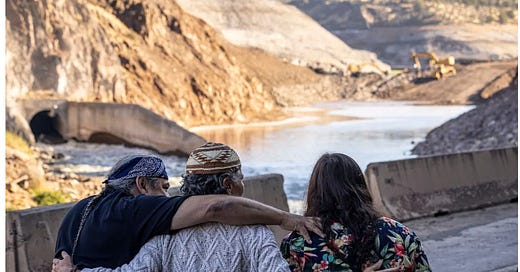‘The largest dam-removal project in history was completed in October, this year, freeing 676 kilometers (420 miles) of the Klamath River and its tributaries in California and Oregon. It's a significant win for tribal nations on the Oregon-California border who for decades have fought to restore the river back to its natural state.
The Klamath is a tribal river, and always has been. Strong tribal leadership—from the Yurok on the lower Klamath, the Karuk of the mid-Klamath, and the Klamath Tribes in Oregon around Upper Klamath Lake—has led the charge to remove these dams.’
When I read this news story, I was overwhelmed with joy. Kingdom values, promoted by small ‘First People Tribes’, had won over large corporations. As I listened to one tribal elder describe his participation in the battle since 1980s, I thought of Jesus’ words in this week’s Gospel Mark 12: 28-34 ‘You shall love the Lord your God with all your heart and with all your soul and with all your mind and with all your strength.’
These peoples had fought with all their heart, soul, mind and strength for the restoration of what were for them a sacred river of God’s creation. They recognized the river as a gift of creation, meant to sustain life in all its forms—not only for their people but for the plants, fish, and animals that depended on its waters.
Their decades-long perseverance reflected a profound love and respect for the natural world, a commitment to stewardship that is central to their identity. In securing the river's freedom, they upheld a sacred duty to honor and protect the land that sustained their ancestors and would sustain future generations.
As I pondered their unwavering dedication, I realized this was a modern testament to loving God through caring for creation. This act of restoration was not just a triumph for the river but a powerful reminder of how we are called to act in harmony with creation, honoring the Creator through love, respect, and care for all that God has made.
Their success against powerful odds speaks to the strength found in faith, community, and the conviction that the land and its waters are not mere resources but sacred trusts.
Their victory is a profound example for us, as individuals and as a faith community. In a world often driven by consumption and control, their unwavering commitment to restoration calls us to examine our own lives. Are we honoring the sacred gifts around us—our relationships, our communities, and the environment? Their fight for the Klamath River teaches us that true love for God and His creation is not passive; it requires the strength to protect, restore, and stand firm against forces that exploit.
As we reflect on the Gospel’s command to love God with all our heart, soul, mind, and strength, may we find inspiration in their resilience and act with the same love and tenacity in our lives. Let us strive to bring healing and hope to the world, faithfully honoring God through our care for one another and all creation.





Amen Deacon!
Today I received a message from a fellow meditator member of the World community for Christian meditation. It was about Laudato Si the encyclical by pope Francis which is now a global movement for care for the planet and the fight against climate change. I’m quoting the email:
The mission of Laudato Si is
"To inspire and mobilize the Catholic community to care for our common home and achieve climate and ecological justice, in collaboration with all people of good will."
There is an movement called: Contemplation with creation
For Pope Francis, contemplation is a way of being from the heart that enables us to receive and respond to God’s love in each moment. “The best antidote against this misuse of our common home is contemplation.” Pope Francis (Catechesis Sept 16 2020)
In Laudato Si’, Pope Francis states that our current ecological crisis requires a change of attitude in our hearts. He connects our destruction of creation to our vast “interior deserts” that lead to frenetic activity, busyness, and overconsumption. Instead, he says, “Christian spirituality proposes an alternative understanding of the quality of life, and encourages a prophetic and contemplative lifestyle.” Contemplation helps us to better hear Creation’s song by opening us to gratitude and awe. Contemplation allows us to open to the cries of the earth and poor, by increasing our capacity to be with the suffering of others. Contemplation finally helps us to hear Creation’s call to us to respond to the healing of our earth by quieting the mind to better discern what is ours to do.